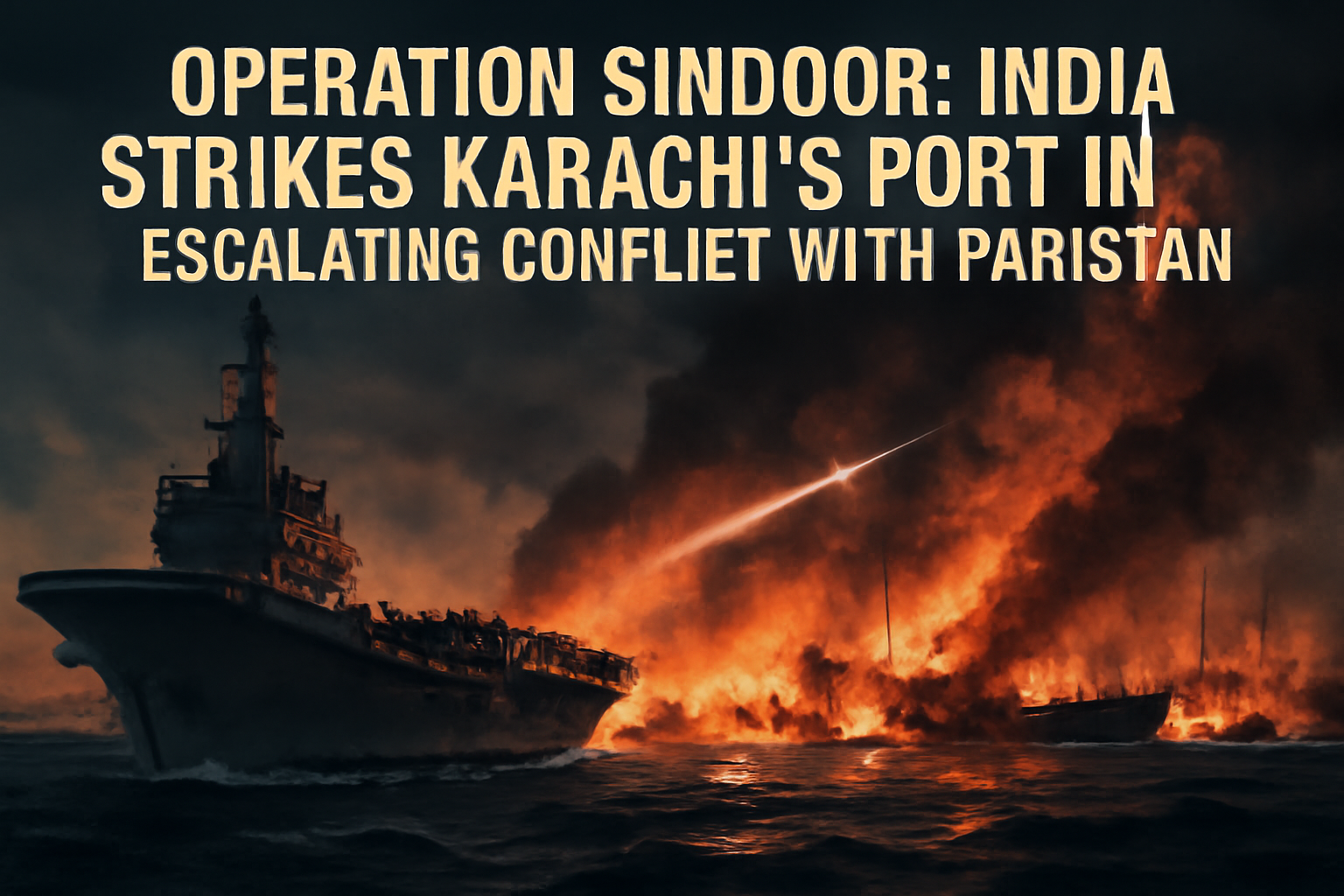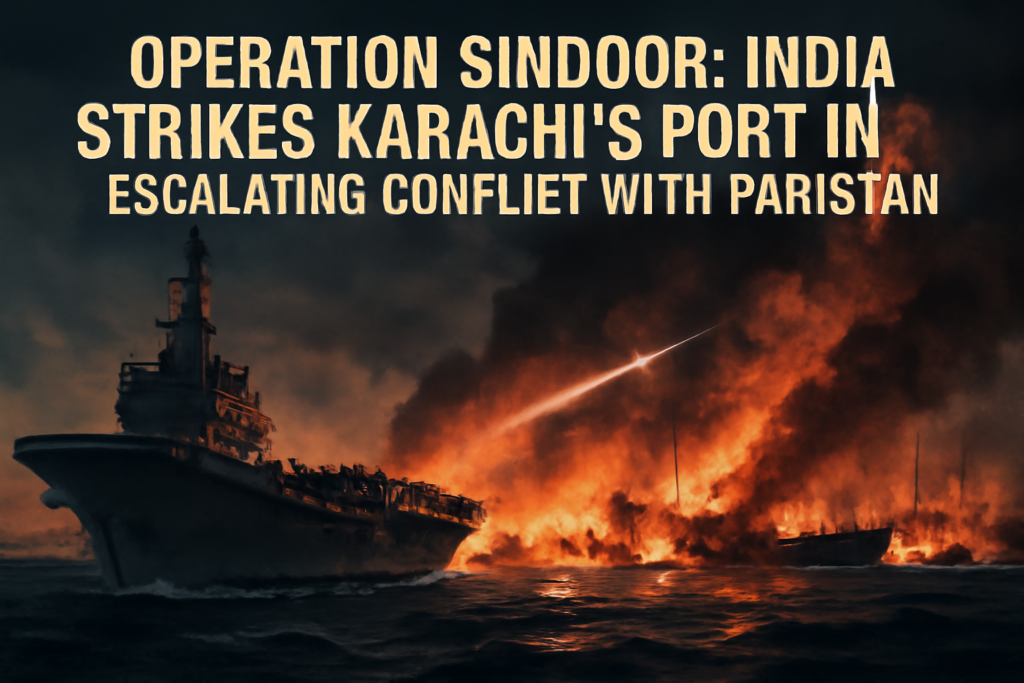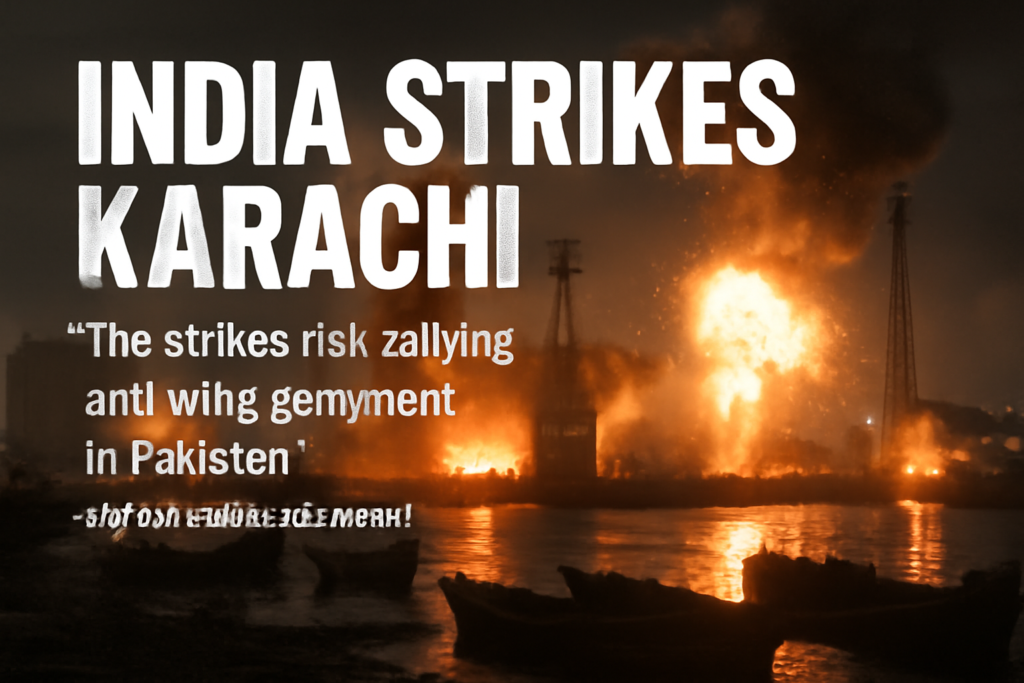
Indian Navy Strikes Karachi Port: A Bold Move in Escalating Tensions
May 8, 2025, New Delhi – In a dramatic escalation of hostilities between India and Pakistan, the Indian Navy, led by the aircraft carrier INS Vikrant, reportedly launched a precision strike on Karachi’s port and naval facilities, triggering massive fires and widespread panic in Pakistan’s largest city. The operation, part of India’s broader military response dubbed “Operation Sindoor,” has intensified the already volatile situation between the two nuclear-armed neighbors, raising global concerns about a potential all-out conflict. This article explores the details of the strike, its strategic implications, and the reactions it has provoked, drawing on credible reports and official statements.

The Strike: A Naval Power Play
According to multiple sources, the Indian Navy’s INS Vikrant, deployed in the Arabian Sea, executed a targeted assault on Karachi’s port and nearby naval bases, including Ormara, on May 8, 2025. The operation involved a combination of missile strikes and drone attacks, with reports indicating seven massive explosions that ignited large-scale fires across the port. Local Pakistani media and eyewitness accounts described thick smoke blanketing the city, with residents fleeing inland amid fears of further attacks. The strikes reportedly crippled key Pakistani naval operations, with unverified claims suggesting the destruction of up to 10 Pakistani warships.
The Indian Ministry of Defense has not officially confirmed the specifics of the naval strike but stated that its actions were part of a broader campaign to neutralize terrorist infrastructure and retaliate for the April 22, 2025, Pahalgam terror attack, which killed 26 Indian civilians. The ministry emphasized that the strikes were “proportionate” and aimed at deterring further aggression from Pakistan. Indian Defense Minister Rajnath Singh, addressing an all-party meeting, claimed that Operation Sindoor had already eliminated at least 100 terrorists across nine targeted sites in Pakistan and Pakistan-occupied Kashmir (PoK).
Posts on X, while not conclusive, reflect the intensity of public sentiment in India, with several users celebrating the strike as a decisive blow to Pakistan’s naval capabilities. One post claimed, “Karachi Port completely destroyed in precision strike by INS Vikrant. Not damaged. Not hit. Erased.” Such statements, though unverified, underscore the nationalistic fervor surrounding the operation.

Strategic Context: Operation Sindoor and Regional Tensions
The Karachi strike is a critical component of Operation Sindoor, launched in response to the Pahalgam attack, which India attributes to Pakistan-based terrorist groups like Jaish-e-Mohammed (JeM) and Lashkar-e-Taiba (LeT). On May 7, 2025, India conducted missile strikes on nine alleged terrorist camps in Pakistan and PoK, including sites in Bahawalpur and Muridke. These strikes killed at least 26 people, according to Pakistani authorities, who claimed the casualties were civilians. India, however, insists the targets were terrorist infrastructure, supported by visual evidence from satellite imagery provided by Maxar Technologies.
The decision to involve the Indian Navy marks a significant escalation, as it extends the conflict beyond land-based operations into the maritime domain. Karachi, Pakistan’s economic hub and a critical node for its naval operations, is a high-value target. The INS Vikrant, India’s indigenously built aircraft carrier, is equipped with advanced missile systems and fighter jets, making it a formidable platform for such operations. The strike demonstrates India’s ability to project power deep into Pakistani territory, leveraging its naval superiority. Pakistan’s navy, with 121 assets compared to India’s 293, is significantly outmatched in both scale and capability.
The timing of the strike coincides with heightened cross-border tensions. On May 8, Pakistan’s military reported shooting down 29 Indian drones across multiple locations, including Karachi, Lahore, and Rawalpindi, claiming one civilian death and four soldiers wounded. India, in turn, accused Pakistan of launching drone and missile attacks on its military installations, which were neutralized by its S-400 air defense systems. Both nations have traded accusations of aggression, with Pakistan’s Prime Minister Shehbaz Sharif vowing to “avenge” the deaths of 31 people killed in India’s earlier missile strikes.
International Reactions and Concerns
The international community has responded with alarm to the escalating conflict. The European Union condemned the Pahalgam terror attack but urged both India and Pakistan to de-escalate and protect civilian lives. Türkiye expressed concerns over India’s strikes, offering diplomatic support to Pakistan, while the United States, through Indian Ambassador Vinay Kwatra, acknowledged India’s right to self-defense but called for restraint. Former U.S. President Donald Trump commented, “I hope India and Pakistan stop now after going tit-for-tat,” reflecting global fears of a broader military confrontation.
The United Nations has yet to issue a formal statement, but analysts note that India’s invocation of Article 51 of the UN Charter, which justifies self-defense against unprovoked aggression, strengthens its diplomatic position. However, Pakistan’s claims of civilian casualties and its threats of retaliation have complicated the narrative, with both nations vying to shape international opinion.
The closure of airspace and airports in both countries has disrupted regional travel and commerce. At least 21 airports in northern India, including Chandigarh and Hindon, remain closed until May 10, while Pakistan has suspended flights from Karachi, Lahore, and Islamabad. The economic fallout is already evident, with Pakistan’s benchmark share index slumping 5.9% and the Indian rupee dropping 1% to 85.71.

Implications for India-Pakistan Relations
The Karachi strike represents a bold assertion of India’s military capabilities and its willingness to take the fight to Pakistan’s heartland. By targeting a major economic and strategic asset, India has signaled that it will not confine its response to the disputed Kashmir region, where conflicts have traditionally been limited. This shift could fundamentally alter the dynamics of India-Pakistan relations, pushing the two nations closer to a full-scale war.
Analysts, however, question the long-term efficacy of such strikes. Ajai Sahni, a security expert cited by Al Jazeera, argues that while India’s actions may disrupt terrorist operations tactically, they are unlikely to dismantle the broader infrastructure of groups like JeM and LeT, which have deep roots in Pakistan. Moreover, the strikes risk galvanizing anti-India sentiment in Pakistan, potentially strengthening the position of hardline elements within its military and government.
For India, the operation carries domestic political weight. Prime Minister Narendra Modi’s government has framed Operation Sindoor as a decisive response to terrorism, earning praise from supporters who view it as a demonstration of national strength. However, the government faces pressure to manage the fallout, including potential Pakistani retaliation and international criticism over civilian casualties.
The Path Forward
As tensions spiral, both nations face critical choices. India’s Foreign Secretary Vikram Misri has stated that any further escalation by Pakistan “will be responded to appropriately,” while Pakistan’s Foreign Minister Ishaq Dar hinted at backchannel communications between the two countries’ national security advisers, suggesting a possible avenue for de-escalation.
The international community, particularly major powers like the United States and China, will play a crucial role in preventing a wider conflict. For now, the region remains on edge, with air raid sirens sounding in Jammu and explosions reported in Indian-administered Kashmir, underscoring the fragility of the situation.
Conclusion
The Indian Navy’s strike on Karachi marks a pivotal moment in the ongoing India-Pakistan conflict, showcasing India’s military reach and resolve. While the operation has bolstered India’s image as a regional power, it has also heightened the risk of retaliation and escalation. As both nations navigate this dangerous juncture, the world watches anxiously, hoping for a resolution that avoids catastrophic consequences.
References:
- NewsX, “INS Vikrant Strikes Pakistan Navy Bases in Karachi and Ormara,” May 8, 2025.
- Republic World, “Operation Sindoor LIVE Updates,” May 8, 2025.
- The Independent, “India-Pakistan latest: Air raid sirens sound in Jammu,” May 8, 2025.
- Reuters, “Explosions rock Indian Kashmir in suspected Pakistani attacks,” May 8, 2025.
- Al Jazeera, “Pakistan vows retaliation after India launches air strikes,” May 7, 2025.
- The Hindu, “Operation Sindoor LIVE: India says choice of de-escalation is with Pakistan,” May 8, 2025.
- Posts on X, various users, May 8, 2025.





